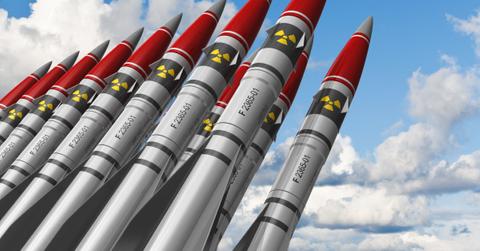 NEWS
NEWSNuclear Weapons Emerge as U.S. Presidential Campaign Issue

Aug. 26 2024, Published 5:22 p.m. ET
Nuclear weapons have emerged as a significant issue in the U.S. presidential election, after President Joe Biden quietly approved a revised nuclear employment strategy and as former President Donald Trump and his allies call for resuming U.S. nuclear weapons testing for the first time since 1992.
Although Trump did not resume live nuclear testing during his first term, the administration reportedly held meetings to discuss the possibility, while adopting a skeptical stance toward arms control agreements, withdrawing from the Iran nuclear deal, and dealing confrontationally with other nuclear powers.
Trump's allies say resuming nuclear tests would help maintain the United States' technical superiority over Russia and China and ensure the reliability of U.S. nuclear weapons. They also say continued U.S. nuclear tests could be used as a negotiating tactic.
Critics and nuclear experts argue that live testing is unnecessary with new computer models available, and could spark a new global arms race.
Meanwhile, Biden in March approved an updated strategy called the "Nuclear Employment Guidance," aiming to prepare the U.S. response to possible challenges from China, Russia and North Korea.
Former Pentagon nuclear strategist Vipin Narang said in a speech earlier this year that the new guidance, which is classified, accounts for “the significant increase in the size and diversity” of China’s nuclear arsenal. Further, While Russian President Vladimir Putin has threatened to use nuclear weapons in Ukraine, the country is also conducting military exercises with China and is believed to be assisting North Korea's missile program.
In June, Pranay Vaddi, the National Security Council’s senior director for arms control and nonproliferation, referred to the new nuclear guidance, which considers whether the U.S. is prepared for coordinated nuclear threats from Russia, China and North Korea, highlighting “the need to deter Russia, [the People's Republic of China] and North Korea simultaneously.”
In 1996, the ICJ under the presidency of Judge Mohammed Bedjaoui, provided an instrumental advisory opinion on the Legality of the Threat or Use of Nuclear Weapons. The ICJ affirmed that it could not “conclude definitively whether the threat or use of nuclear weapons would be lawful or unlawful in an extreme circumstance of self-defense.”
Want OK! each day? Sign up here!
But the dangers of live nuclear testing are still being felt today, with French President Emmanuel Macron just this year signing a new law acknowledging that France coerced French Polynesia into hosting nuclear tests from 1966 to 1996, and committing the government to compensate Polynesians affected by radiation-induced illnesses. The move stopped short of providing annual remediation funding, however, after the provision was struck down by France’s Constitutional Council.
Investigations in recent years have found the long-term health impacts in French Polynesia to be far greater than previously admitted by the French government, even affecting new generations of children born after the last live test in 1996.
Activists in Algeria, meanwhile, are still seeking compensation for the nuclear tests France conducted there. In 2010, France passed a law that recognized direct victims of the tests, and their entitlement to compensation, but those impacted by the lingering effects of the tests were not.
In February of this year, more than a dozen human rights organizations called on the French government to declassify the entire scope of nuclear tests conducted in the Algerian Sahara. Activists are also calling on the French government to provide Algerian authorities with the full list of places where nuclear waste was buried, describing the buried materials, and publishing data related to contaminated areas.
TMX contributed to this story.

